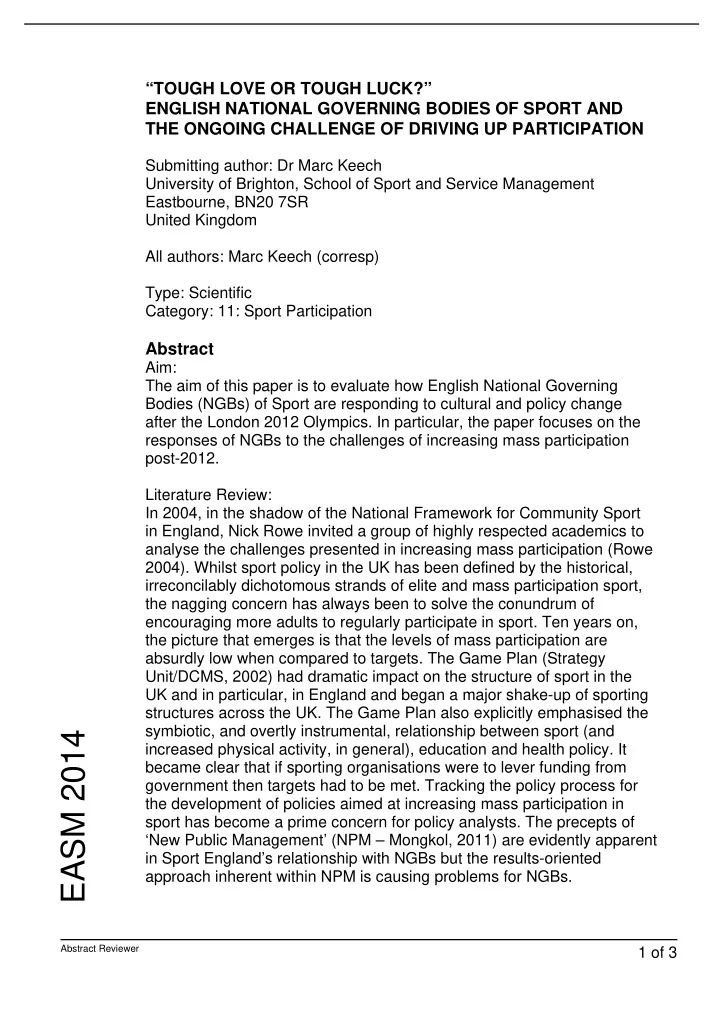

“TOUGH LOVE OR TOUGH LUCK?”� ENGLISH NATIONAL GOVERNING BODIES OF SPORT AND THE ONGOING CHALLENGE OF DRIVING UP PARTICIPATION Submitting author: Dr Marc Keech University of Brighton, School of Sport and Service Management Eastbourne, BN20 7SR United Kingdom All authors: Marc Keech (corresp) Type: Scientific Category: 11: Sport Participation Abstract Aim:� The aim of this paper is to evaluate how English National Governing Bodies (NGBs) of Sport are responding to cultural and policy change after the London 2012 Olympics. In particular, the paper focuses on the responses of NGBs to the challenges of increasing mass participation post-2012.� � Literature Review:� In 2004, in the shadow of the National Framework for Community Sport in England, Nick Rowe invited a group of highly respected academics to analyse the challenges presented in increasing mass participation (Rowe 2004). Whilst sport policy in the UK has been defined by the historical, irreconcilably dichotomous strands of elite and mass participation sport, the nagging concern has always been to solve the conundrum of encouraging more adults to regularly participate in sport. Ten years on, the picture that emerges is that the levels of mass participation are absurdly low when compared to targets. The Game Plan (Strategy Unit/DCMS, 2002) had dramatic impact on the structure of sport in the UK and in particular, in England and began a major shake-up of sporting structures across the UK. The Game Plan also explicitly emphasised the symbiotic, and overtly instrumental, relationship between sport (and EASM 2014 increased physical activity, in general), education and health policy. It became clear that if sporting organisations were to lever funding from government then targets had to be met. Tracking the policy process for the development of policies aimed at increasing mass participation in sport has become a prime concern for policy analysts. The precepts of ‘New Public Management’ (NPM – Mongkol, 2011) are evidently apparent in Sport England’s relationship with NGBs but the results-oriented approach inherent within NPM is causing problems for NGBs. � � Abstract Reviewer 1 of 3
Methodology:� The paper is based on interviews with representatives from a range of English NGBs, primarily Heads of Development or their nominees. Axial coding has been utilised to refine the analysis of responses. Initial results indicate that a simplified measure of performance, such as participation figures, runs many risks including the withdrawal of allocated funding based on results illustrated by the Active People Survey. � � Findings:� Echoing the ‘no compromise’ approach of UK Sport, Sport England invited recipients of its weekly newsletter to ‘read about our tough approach to sport delivery’ (Sport England March 28, 2014). Respondents from a number of sports were already ‘shattered’, ‘threatened’ and ‘immensely concerned’ about the funding model being employed and did not always recognise fully why funding had been recalibrated. Conversely, the small minority of sports able to raise participation questioned quietly why they might not receive further funding. One respondent noted that they couldn’t decide if their sport had been dealt a hand of “tough love” or been told “tough luck!” but also questioned if NGBs now considered it their “right” to be funded. The contrast between the simplified objective of raising participation and the complexities involved in delivering targets for increased participation exhibits confusion amongst employees of NGBs. Still reliant on imprecise and somewhat unfeasible Whole Sport Plans, NGBs are being measured on their ‘performance’ in raising participation. Having asked for greater autonomy in 2007, despite numerous commentators (e.g. Collins, 2008) noting their lack of capacity to deliver, NGBs were tasked with whole sport remits. Whilst elite sport policy is measured by tangible outcomes (medals), mass participation registers well-respected professional exhibiting differing responses to policy targets, primarily because senior managers are not able to either comprehend or communicate the policy landscape with sufficient detail. The primary conclusion is that NGBs are not sure how to respond to Sport England and many consider that those managing sport policy do not have sufficient capacity or awareness of the complexities involved in raising participation. It’s a recurring theme, but increasing mass participation remains the insoluble problem for sport in England, the UK and, most likely, in many other countries. � � EASM 2014 Text word count: 657 References References� Collins, M.F. (2008) Public Policies on Sports Development, in Girginov, V. (ed.) Managing Sports Development, Oxford, Elsevier.� Mongkol, K. (2011) The Critical Review of New Public Management Model and its Criticisms. Research Journal of Business Management, Vol.5, No.1, pp.35-43.� Abstract Reviewer 2 of 3
Rowe, N. (2004) (ed.) Driving up Participation: the Challenge for Sport, London, Sport England.� Rowe, N., Adams, R. and Beasley, N. (2004) Driving up Participation in Sport: the social context, the trends, the prospects and the challenges, in: Rowe, N. (ed.) Driving up Participation: the Challenge for Sport, London, Sport England.� Sport England (2014) Read about our tough approach to sport delivery, email newsletter sent March 28, 2014, London, Sport England. EASM 2014 Abstract Reviewer 3 of 3
Recommend
More recommend